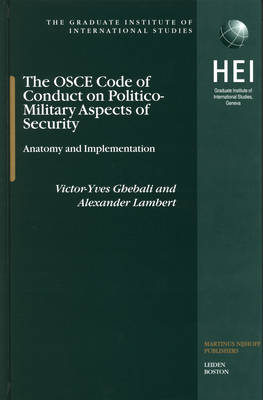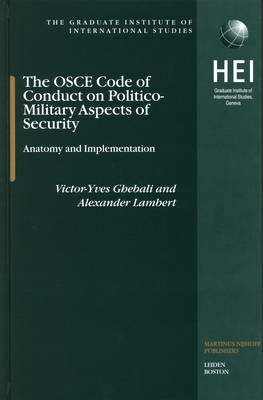
- Afhalen na 1 uur in een winkel met voorraad
- Gratis thuislevering in België vanaf € 30
- Ruim aanbod met 7 miljoen producten
- Afhalen na 1 uur in een winkel met voorraad
- Gratis thuislevering in België vanaf € 30
- Ruim aanbod met 7 miljoen producten
The OSCE Code of Conduct on Politico-Military Aspects of Security
Anatomy and Implementation
Victor-Yves Ghebali
€ 386,45
+ 772 punten
Omschrijving
A regime for the democratic control of armed forces exists in the OSCE area (which stretches from Vancouver to Vladivostok) through a "Code of Conduct on Politico-Military Aspects of Security" (1994). This instrument, which links civil-military relations to human rights and international humanitarian law, has no counterpart in other security organizations. Intruding into an area of state power hitherto considered a sanctum sanctorum, it commits the OSCE member states to a regular exchange of information on the status of the democratic control of their armed forces, as well as on such issues as the fight against terrorism and the stationing of troops on foreign soil.
The book represents an urgently needed reference work on both the contents and the impact of the Code; drawing on as-yet unpublished materials, it offers a paragraph-by-paragraph commentary on the Code, as well as an in-depth assessment of implementation trends in the OSCE region.
The book represents an urgently needed reference work on both the contents and the impact of the Code; drawing on as-yet unpublished materials, it offers a paragraph-by-paragraph commentary on the Code, as well as an in-depth assessment of implementation trends in the OSCE region.
Specificaties
Betrokkenen
- Auteur(s):
- Uitgeverij:
Inhoud
- Aantal bladzijden:
- 452
- Taal:
- Engels
- Reeks:
- Reeksnummer:
- nr. 5
Eigenschappen
- Productcode (EAN):
- 9789004142923
- Verschijningsdatum:
- 14/01/2005
- Uitvoering:
- Hardcover
- Formaat:
- Genaaid
- Afmetingen:
- 162 mm x 242 mm
- Gewicht:
- 938 g

Alleen bij Standaard Boekhandel
+ 772 punten op je klantenkaart van Standaard Boekhandel
Beoordelingen
We publiceren alleen reviews die voldoen aan de voorwaarden voor reviews. Bekijk onze voorwaarden voor reviews.










